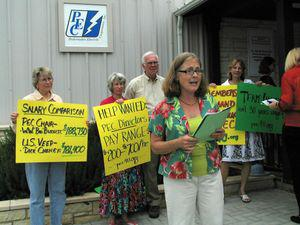In 2008, decades of corruption came to an end at Pedernales Electric Cooperative, the largest rural electric cooperative in the US, serving the region outside Austin Texas. Throughout its seventy year history, the co-op had never returned capital credits to its members, and routinely engaged in financial practices that enriched the Board and management at the membership’s expense.
But early in 2007, a single member, acting on his own, called the co-op to ask about what solar incentives were offered to the membership. When he was told that there were none, he began asking more questions: Who makes the policy? Who’s on the board? How do people get on the board? PEC responded to his questions by going to court, and getting a cease and desist order to try to prevent him, and other members, from learning how the co-op operated.
When that reached the local news media, a group of members organized a members’ association called PEC 4 U. The local chapter of Clean Water Action and Public Citizen-Texas provided background organizing support. Members filed a lawsuit over the lack of capital credits in 2007 and then worked to organize a demonstration outside of the PEC board meeting. As the lawsuit moved forward with depositions from the PEC leaders, the CEO and manager announced retirement in early 2008.
In response to member demand, the board abolished their nominating committee, which opened up the elections to anyone who could gather enough signatures. The first open election was held in 2008 and PEC 4 U, along with their nonprofit partners, helped elect 5 of 7 reform candidates to the board.
Since then, PEC has returned capital credits to members annually, and made substantial changes to financial practices. The board enacted new bylaws and a member bill of rights. Additionally, PEC set the most aggressive REC target for renewable energy in the US of 30% renewable by 2020 with an additional 20% reduction in demand growth through energy efficiency.
However, in 2015, an ideologically driven Board election campaign, with financial and organizing support from oil and coal interests outside PEC territory, unseated one of the incumbents who had supported these reforms. The Board maintains a strong majority supporting the co-op’s current direction, but the members are anticipating the need to defend against fossil-fuel backed attacks.

